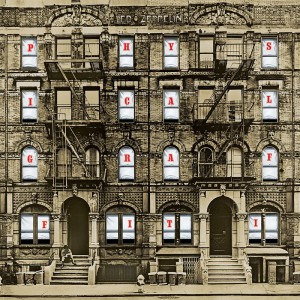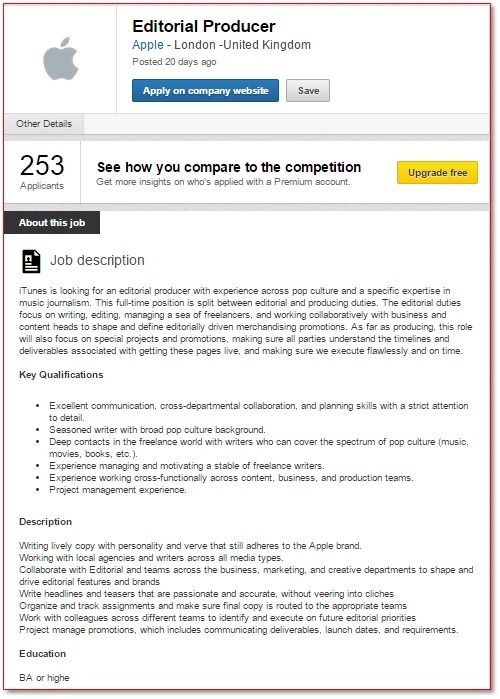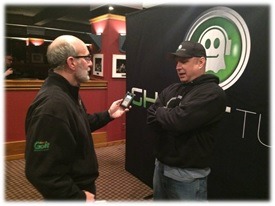Last week, we aired it out a bit with the Coleman Insights crew about whose pyramid – or should we say whose hierarchy of brand importance – is most relevant to the current competitive needs of the radio business.
And the answer may be that for music stations, in particular, Coleman’s foundation of a strong music position and our priority on personalities that matter actually work together to improve station brands.
The reason that I’m rapidly coming to this conclusion is not because of research I’ve seen or even in many of your comments on the topic.
It turns out that the biggest, richest, most powerful, and most culturally impactful company in the world is proving the point.
Apple, which up to now has created and marketed some awesome devices and a lot of digital music, is reaching the conclusion that context, personality, richness, history, curation, and color are a part of so many people’s musical footprint.
We don’t just listen to music – we experience it. And these moments are enhanced by a savvy guide, an intuitive Sherpa, or a connected musical concierge.
The first clue that Apple was going to “Think Music Different” was when they hired BBC presenter and personality Zane Lowe, stirring up all sorts of speculation about where the company is headed in its musical journey. We touched on this in a previous blog post last month.
But now comes Apple’s next message to the entire music, radio, and audio ecosphere – they’re in search of a bona fide Chief Musicologist who will end up overseeing an entire team of writers and producers. OK, they’re referring to the position as an “Editorial Producer,” but as you read the fine print, they want someone who knows the music and can tell compelling stories about it on multiple channels:
One look at the “Description” section near the bottom tells you everything you need to know about Apple’s trajectory and mission with music. Just creating cool playlists and building mechanisms that allow the user to skip songs is no longer enough. After awhile, 10,000 songs in an iPod or an iPhone gets boring. And that has to be part of the reason why Apple is looking to enrich the music experience and make it more robust.
Technology, code, and algorithms will only get you so far. Many of these same human resources that Apple is now seeking are what broadcast radio – when it’s on its game – can do better than everything else.
And now that there’s lots of “everything else” in the expanding music landscape, Apple sees opportunity in curation, entertainment, great writing, and personality.
Broadcast radio would do well to pay attention to Apple, and even follow its lead. That’s because local music guidance is something that even Apple won’t provide.
There aren’t a lot of people out there who fit the bill, but one that I know well is Gary Graff, former entertainment writer for the Detroit Free Press who has built a career around music journalism.
Gary has authored a number of music-centric books and has interviewed seemingly every music star and icon over the past several decades. He knows his music, asks the questions a fan wants to hear answered, and makes the music come alive with his writing. If you want to know whether an album or a concert is worth your money, Gary has the inside track, whether it’s Madonna, Jack White, Sam Smith, or Garth Brooks (pictured here with Gary).
Over the years, he has provided music commentary and coverage in Detroit at WRIF and WCSX, and also currently does the same for Bob & Brian at The Hog/Milwaukee.
As Gary explains, “Regardless of technological advancement, content — or, if you prefer, information — is still king. And queen and the rest of the royal family. Even more so in this day and age. In order to compete and be vital, radio has to be more than just another playlist option; folks are doing that just fine for themselves, thank you very much.”
But not every station is lucky enough to have access to an expert like Gary. And these days, not everyone has a Pat Martin, Pierre Robert, Bob Stroud, Bobby Skafish, Joe Benson, Mike Halloran, Doug Podell, or Andre Gardner on staff. Or carries music specialty shows like Nick Michaels’ “The Deep End.”
While Apple is looking for someone with a college degree, all of the aforementioned DJs I mentioned have a higher education in music appreciation, whether or not they have a sheepskin to prove it. They live the music, they went to the concerts (and still do!), they’re collectors, and their fans themselves.
It wasn’t that many years ago when great stations had several people on staff with knowledge, wisdom, and stories about the music and why it matters. And you can bank on the fact that behind the resurgence of vinyl sales is the perspective from DJs who have spent a lot of time reading the backs of thousands of albums, as well as reading countless interviews in Rolling Stone and other music publications to stay up to date and current.
 But what’s happening here goes beyond a nostalgic love of LPs. There’s a musical renaissance occurring as consumers are more engaged with music more than they’ve been in decades. From a love of music trivia information to other source material that enhances the music and makes it more interesting, the iPod, streaming, and other digital platforms have re-energized this art form. Search engines, fan sites, and other web-enabled tools make it easy and fun to learn more about the music we love.
But what’s happening here goes beyond a nostalgic love of LPs. There’s a musical renaissance occurring as consumers are more engaged with music more than they’ve been in decades. From a love of music trivia information to other source material that enhances the music and makes it more interesting, the iPod, streaming, and other digital platforms have re-energized this art form. Search engines, fan sites, and other web-enabled tools make it easy and fun to learn more about the music we love.
And the competition is ramping up, even inside broadcast radio, and here’s a case in point. The re-release of Led Zeppelin’s re-mastered “Physical Graffiti” album (along with other tracks and previously unreleased material) is a very big deal in the Rock and Classic Rock communities. And with multiple stations in these formats in virtually every U.S. market, you’d expect these stations would be stepping up to tell the story behind this album – not just give them away to caller 9.
But perhaps the broadcast brand doing one of the best jobs of providing perspective and creation is none other than NPR. On their “All Songs Considered” feature, Jimmy Page spoke to musicologists Bob Boilen and Robin Hilton about the album, his iconic band, his musical influences, why Led Zep has stood the test of time, and just about everything else in a 45 minute interview. This kind of coverage, perspective, and storytelling is precisely what Apple aspires to – and broadcast radio must do to stay relevant and unique.
As is usually the case, Apple sniffs opportunity, and will pursue it with more verve, style, and resources than its competitors. But on the local level, every music station in America, whether you’re in New York, Nantucket, or Natchitoches could benefit from some music knowledge, context, and curation.
If Apple’s research is proving this out, chances are yours will, too.
If you ask the right questions.
Thanks to my partner in Classic Rockdom, Tom Bender. And sorry that I couldn’t mention all of radio’s smart and savvy musicologists.
–
- The Exponential Value of Nurturing Radio Superfans - April 28, 2025
- What To Do If Your Radio Station Goes Through A Midlife Crisis - April 25, 2025
- A 2020 Lesson?It Could All Be Gone In A Flash - April 24, 2025






Finally. I’ve used this very concept to fuel my show for the last 2 years and my numbers prove its working. When you can get ‘Crazy Train’ anywhere anytime it’s what goes before it that makes it interesting again.
Exactly, Anne. That context, storytelling, and interesting factoids are what can set FM music radio apart. Thanks for chiming in.
I think you’re right on target with this article Fred. However, I would take it a step further. Yes, radio needs more folks that are indeed knowledgeable on the music they play, and yes being informed on the music, not just the latest rumor and innuendo, it used to be a prerequisite. Hosts need to be more knowledgeable. But they also need to be real damn people too. Music radio could use a lesson from talk, hosts need opinions. What ever happened to the old “smash or trash?” Being a musically knowledgeable host should mean more than just facts and figures on what they are playing.
I will almost die a happy man the day I hear a host come out of a record and be a real person saying, “wow, that song really sucks, I refuse to play that again, I don’t care if they fire me, I refuse.” Sure, it would be great to hear them tell me why it sucks. “It’s too derivative, it’s banal and just another cookie-cutter pop piece of dribble.” An educated host with an opinion is something missing on music radio. Let’s look at the music critic to end all music critics, Lester Bangs. Lester could tell you why the Shaggs were better than The Beatles, and by the end of the review, you would shake your head and have to agree. Music critic journo’s had opinions, it’s what sold the dead trees.
I, yes even I, am an avid NPR listener. No one ever gives a real opinion on NPR. All the music is just great. Every music host on the radio is a drone that mirrors the playlist of the station. Happy, chirpy, no-opinion drones that just love everything the station plays. Aint it just great! I love it all! Wheeee! Music stations highest rated daypart, morning drive, is it’s most opinion driven slot. So, yea, opinions don’t just work on talk. Where are the real people on music radio? An educated host, with a well rounded and educated view on music, would have a gosh darn opinion. AAA needs this most of all. But the hosts, who one would think should be the best musicologists of all on the radio, still hold fort using an outdated model of “I love everything!”
We’re all told that the millennials are the most “media savvy” generation. Dollars for doughnuts they can see through the non-opinionated host on the station where they are essentially a yes man for selector. The irony of the generation of irony, ironical ain’t it. Of course, this is just my opinion. And yes, the Shaggs were better than the Beatles! * You forgot George Gimarc, I used to try and stump him, impossible.
John, thanks so much for the wise and thoughtful comments. I think you’ve hit on a real potential opportunity for commercial radio – transparency, believability, and honesty. And you’re correct that Millennials – in particular – see through the smiles and thumbs-ups for everything. The days of ticking off the labels are over, and being straight with the audience is a priority and a chance to bring value to the station:listener relationship. Most appreciated.
Fred. Thank you. I’ve been preaching this for years. Can we please get some on-air talent that will talk to us and tell us something about the music that we love. It’s not that hard to find the info either (Hello, Internet!). When I wrote and produced The Weekly Pop 20 with Ann Duran, that’s what we did and got great response from the audience.
Peter, and I think that the iPods, playlist platforms, jockless channels, and algorithmically driven services open the door for FM music radio to step in with something that is warm, unique, local, and personal. Thanks for commenting.
Interesting article Fred Jacobs. Of course, public radio is the place for the context of the music. As a public radio music doc producer, I’ve periodically pitched music docs to commercial stations to the sounds of crickets for the last 15 years. But they are all still here.. https://www.prx.org/playlists/6475 – timelessly scripted and ready to make commercial stations something people actually talk about again. In the meantime, it will be public stations, like WNCW in Spindale/Charlotte, who reap the benefits – as they will tonight when they air my two-hour special on Bob Dylan’s Blood On the Tracks and talk with Bill Berg, the session drummer on half the album, whom I interviewed too. He lives nearby and is coming in to do a guest DJ hour and conversation before the show. Sorry if this sounds self promotional or defensive but in general, my efforts to bring this kind of content to commercial radio in the 1980’s and 1990’s were often resisted by “liner-note / music sweep” philosophies. More informed presenters and more connection with their local communities is something all commercial stations used to have 30 years ago and now are scrambling to reassemble. Also no denying that many made boatloads of money in these 30 years too by stripping down and becoming music boxes… now with music boxes so common, time to go back to the drawing board. Thanks for always offering stimulating discussion Fred!
Paul, this neither sounds self-promotional nor defensive – it’s the truth. You’ve spent quality time in both worlds and have a basis for comparison. A big difference now is that commercial stations that are understandably gun shy about putting a lot of spoken word content on a music station now have other assets, platforms, and channels. That may be playing both ends against the middle, but websites, social media pages, secondary streams, podcasts, and HD Radio channels can be utilized to bring more rich content to brands. Thanks for taking the time to weigh in.
Yup Fred. That would be a creative use of auxiliary platforms – although if you take a risk in the dark forest, does anyone know if you’re really doing it? And it begs a question for me of all the “spoken word” dead ends that a music station will allow on its typical local morning show when it could try offering a segment for music fans that is just pure worthwhile, meaty context for the music that they say their stations are “all about” the rest of the day. If commercial stations would be willing to allow for a slightly brainier reflection on where this music came from, why it’s cool, I would take one of my long-form shows about say, one of the Beatles’ great albums and break it up to give them two weeks of ten, 6 to 10 minute modules – one on each song on the album – that could run in morning drive to mark the album’s anniversary release. I think it’s the kind of thing that would get listeners saying “Are you listening to that series on Sgt. Pepper that K-Rock is running? Every morning at 9:30….”
I think it’s a brand by brand situation, Paul, but your points are well-taken. Strong content that is well-packaged, could be great for setting appointments and cracking through the mush. Thanks again for commenting and providing more food for thought.
It does my heart good to hear news like this.
A few months after I launched my show In 2008 I received an email from a listener who said that nothing on commercial radio could beat my program. I modestly thanked him and didn’t think much of it. It turned out he was a major radio junkie, a frequent poster on radio message boards, and an avid fan of many Toronto (and US border) stations.
It always seemed a no brainer to me that a radio show needed more than “that was” and “this is” and required a love of the music and desire to do research to make it better.
Absolutely, John. As consumers seemingly gravitate to playlist platforms, the need for smart, curated radio grows. Thanks for sharing the story.
Thanks, Alan. It’s clearly an interesting situation for broadcasters – back to the future. Hope you’re doing well.